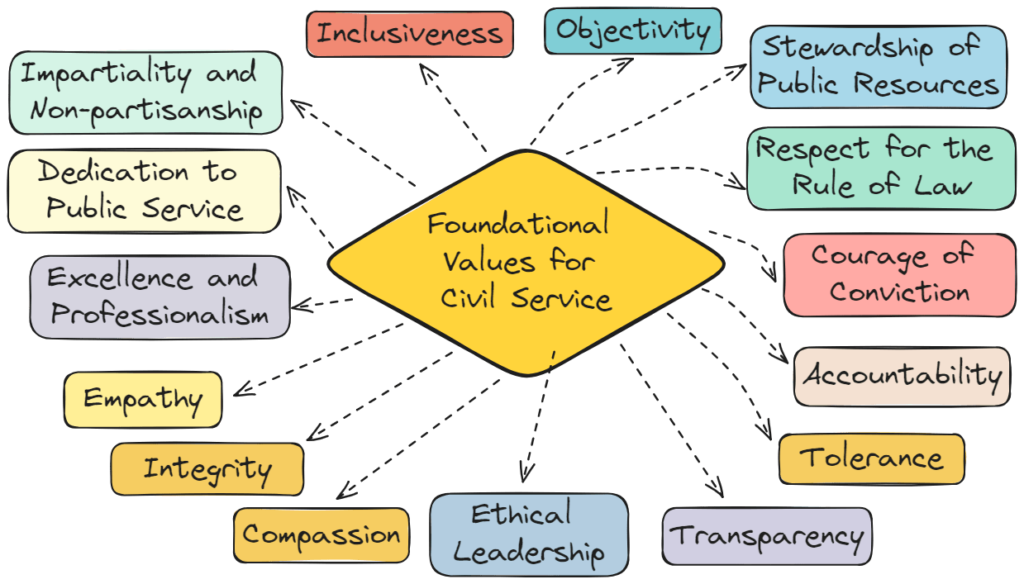Foundational Values for Civil Service
Foundational Values for Civil Service
The foundational values for civil service form the bedrock upon which the ethics, conduct, and actions of civil servants are based. These values guide civil servants in their decision-making processes, ensuring that their actions are in the best interest of the public. Here’s a detailed look at each of the mentioned values with examples:
1. Integrity
This involves honesty, ethical behavior, and adherence to moral principles. Civil servants must act with integrity, avoiding conflicts of interest and personal gain. For example, a government official refusing a bribe to expedite a permit demonstrates integrity.
2. Impartiality and Non-partisanship
Civil servants must serve the government of the day and the public without bias. They should not let their personal beliefs or affiliations influence their decisions. An example is an election officer who ensures a fair voting process without favoring any political party.
3. Objectivity
Decisions should be based on rigorous analysis of evidence and information, not on personal feelings or preferences. For instance, when allocating resources for disaster relief, a civil servant should assess the areas of greatest need based on data, rather than distributing resources based on personal connections or biases.
4. Dedication to Public Service
This value emphasizes the commitment to serve the public and the common good above personal interests. An example could be a public health official working tirelessly during a pandemic to ensure the health and safety of the population, often at personal risk.
5. Empathy, Tolerance, and Compassion towards the Weaker Sections
Civil servants should understand and address the needs and challenges faced by marginalized and vulnerable groups. For example, a social worker in a government agency designing programs specifically to aid homeless individuals or families living below the poverty line demonstrates empathy and compassion.
6. Transparency
This involves openness in the government’s decision-making processes, allowing the public to be informed about actions and decisions that affect them. For example, a government department publishing reports on its website about how it allocates funds demonstrates transparency.
7. Accountability
Civil servants are accountable for their decisions and actions to the public and must be willing to explain and justify their actions. An example is a city councilor who holds regular public meetings to report on initiatives and receive feedback from constituents.
8. Excellence and Professionalism
This value emphasizes the importance of maintaining high standards of work, continuous improvement, and competence in the civil service. For example, a teacher in a public school engaging in ongoing professional development to better serve students embodies this value.
9. Ethical Leadership
Leaders in the civil service should demonstrate ethical behavior and decision-making, setting a positive example for others. An example is a senior government official who promotes a culture of honesty and integrity within their department, encouraging staff to adhere to ethical standards.
10. Inclusiveness
Ensuring that all groups, including minorities and marginalized communities, have access to services and opportunities. An example is implementing policies that ensure equal employment opportunities in government jobs for all, regardless of race, gender, or disability.
11. Respect for the Rule of Law
Civil servants must operate within the framework of the law, ensuring that all actions and decisions are legal and just. For example, a law enforcement officer applying the law fairly and without prejudice upholds this value.
12. Courage of Conviction
Having the bravery to make difficult decisions and stand by them, even in the face of opposition or personal risk. For example, a whistleblower in a government agency exposing corruption, despite potential retaliation, demonstrates this value.
13. Stewardship of Public Resources
This involves managing public resources responsibly and efficiently, ensuring they are used effectively for the public good. An example is a government official who implements measures to reduce wasteful expenditure within their department.


